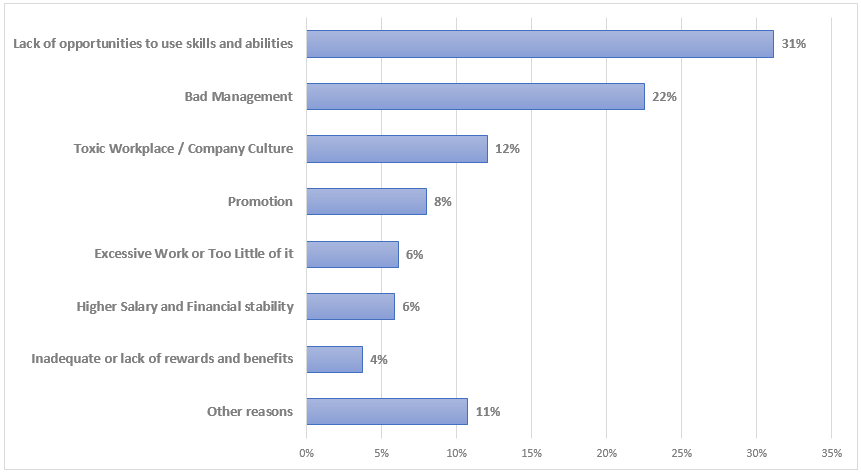There are many reasons people quit their jobs.
It’s not always because of salary, like many people, including managers, have been led to — sometimes erroneously — to believe.
The other reasons people quit could be different: they are getting married and moving; they have an unlikable boss; their goals are changing and they’re leaving due to inadequate motivation or vision; they’re leaving to acquire an advanced degree.
All of these reasons differ for every individual, and because of that, they can be quite difficult for a manager to address.
That being said, employee retention is squarely in the domain of managers, and the majority of employees quit their jobs for reasons that are under the control of managers.
That is a fact.
When it comes to retention, managers make a difference
In every workplace, managers have the power to control elements such as culture and environment, clarity of vision, employees’ perceptions of their roles and responsibilities and providing tools to increase employee success. Because of this, managers can be one of the big reasons employees decide to leave.
If managers are doing their jobs and are in touch with their staff through regular communication, problem-solving feedback, and recognition, they CAN reduce turnover rates.
As a manager, you have the power to prevent issues with employee retention by creating processes, systems and requirements that will make employees stay longer and work productively in your company. It is critical for managers to put these systems in place and support the needs of employees, increase market compensation and benefits, generate meaningful work and have a meaningful and significant effect on employees’ work and workplace.
Someone once said, “People leave managers, not companies,” but is that true? Is this really the main reason why people leave?
Around June 2005, I had been working as a recruiter for almost a year, and I found an article titled The Main Reasons Why People Leave Their Jobs. It focused on one topic: That managers are the main reason why people leave jobs, and the second reason is for a higher salary.
I have always been interested in this topic. As a recruiter, it’s crucial to know the reasons why employees leave for another opportunity. It’s also important to know why any one person is leaving the company because, in many cases, if one person is not happy then other team members could be unhappy for the very same reason.
That article made me question whether those two things were the real reasons why people leave their jobs. At that time, I was still new in recruitment, but during my first year, I had already heard many reasons why people wanted to quit.
Some of them were only looking for more money, and others shared scary stories about their bosses, but many cited other reasons. I could not compare my findings with those in the article because I did not have the data and I just don’t like to guess.
At that moment, I decided to start my own research. I was not sure if it was a good idea or not, but as always, the only way to find out was to start. So. I started collecting data.
How Curiosity Turned into a Long-Term Hobby
I have always said that the hardest part is when you start doing something. Once you get past that, the rest is easy.
However, if you want to collect data and generate some good results from it, starting is not enough — you also need a plan. I thought I would never say this, but my sociology studies came in handy here. In 2005, I started collecting the reasons why people left their jobs.
During every single exit interview (over the phone and in person) I always asked, “What is the main reason you are leaving your current job?” If the answer was “Because of the boss,” I added a point to the data set representing this reason in my Excel spreadsheet. If the answer was different, I just added a new row to the spreadsheet and started a new count.
In that first year alone, I interviewed 679 people from various fields (IT, engineering, finance, marketing, sales, and more), and my spreadsheet was full of reasons as to why people left their jobs. After the first year, I asked myself whether data from one year was enough to cover every possible reason.
I knew that the test group was not big enough because I had only a small number of people whom I had interviewed. I was also curious as to whether the reasons would change over the years. That is why I continued to collect data, unsure of how long I would have to continue.
This curiosity turned into a hobby, and I continued collecting data for the next 10 years. The pool of people grew from 679 to 8,509 (although I did not collect reasons from all the people that I interviewed). The pool of answers came from people with various levels of seniority and different fields, cities, and locations.
The Top 7 Reasons Why People Change Jobs
These are the seven (7) main reasons why employees quit their jobs, based on my 10-year research:
1 – Lack of Opportunity
When people can put their skills and abilities to use in the jobs they’re doing, they tend to feel a sense of usefulness, self-confidence, and accomplishment. Employees are happier if they’re engaged in activities at which they are good that exercise their skills and abilities even more.
People want to develop their skills, and if a job doesn’t give them the ability to do that, they will start looking for one that offers it. This same applies to opportunities; if a workplace does not offer opportunities for growth and advancement, employees will go where they can find them.
People want to apply their knowledge and improve at what they’re doing. They’re looking for a challenge, and if they feel that their skills are not being challenged, they will feel unfulfilled. It’s like a pilot who loves flying but isn’t able to fly.
Remember: People are looking for fulfillment, purpose, and growth in their job.
2 – Bad Management
In the article from 2005, managers were cited as the main factor causing employees to leave. During my research, I found that managers remain among the top three reasons why people quit their jobs.
Because a managerial position is usually a step up on the company’s ladder, and any worker can be promoted irrespective of their skill level, many organizations make the mistake of promoting the wrong people into managerial positions. This is s a mistake because a manager is a leadership role and requires skills such as interpersonal communications as well as the technical skills that are required for the job.
However, not all managers have these skills or have had the right training to acquire them. Many organizations have managers that do not give feedback or coaching, but instead, resort to screaming and yelling at the employees they’re supposed to guide. In addition, unclear expectations can leave employees frustrated and make them want to leave an organization.
If company leadership is not helping managers to develop into leaders, they will start losing employees, and in the end, they’ll lose the managers themselves. The impact of this on hiring activities will remain for a lot longer, though, because people who have already left due to a bad manager will not be sharing any positive reviews about that company.
Note: Bad management very often means that people had a bad boss or bad local management team. For example, people who work in France for a company with headquarters in the UK very often blame the local managers in their country for being bad, but it could also be bad management in HQ in the UK and a great management team in France. People can have a great boss, but other colleagues (very often from other teams) may not and could create a toxic work environment. I know that there is a thin line between bad management and a toxic workplace, but I decided to not to combine them together in my data but to share it in the way I collected it.
3 – A Toxic Workplace or Company Culture
In an ideal workplace, everyone behaves with courtesy and colleagues complement one another. Bosses even check up on staff occasionally and are interested in what’s going on in their personal lives.
However, as we all know, there is no ideal workplace, and personalities do not always blend so seamlessly. In every organization, some occasional clashes, interpersonal conflicts, office gossip, cunning workers, sly bosses, attention-seeking colleagues, and inconsiderate co-workers could appear, and any of those could turn into the reason that workers consider leaving a job.
One of the problems could be inter-office competition. Even if a workplace is generous, providing flexible hours and generous vacation, a workplace filled with competitors might actually hinder workers from making full use of the benefits available to them. Employees may feel that making use of them by, for example, scheduling vacations, could get them penalized, causing them to be at a competitive disadvantage and making them feel dissatisfied.
Company culture can vary from department to department and even from manager to manager, so leaders in every company need to be consistent in building the same culture throughout the entire organization.
4 – Career Advancement and Promotions
When most people they realize that they are not moving up the ladder, they leave. If they find out that, despite how hard they have worked or how well they are doing at their job, they will not be promoted to a higher paying and more demanding position, they will leave.
In the same vein, if a less qualified or less capable member of the team gets a juicy position that the more qualified employee wants, he or she may start to look elsewhere.
Sometimes, the company does not have space for six managers in one small team of 10 people, but people still want to move up the ladder.
5 – Excessive or Too Little Work
Good employees are often asked to take on many tasks, primarily because they may have, at one time or another, used their initiative to do more work than they were initially asked to do. Extra tasks can cause a good employee to work long hours, causing frustration and lack of motivation, which could ultimately lead to total burnout. In the same vein, a very good worker might encounter roadblocks when they are asked to take on new tasks, which can result in boredom and a lack of fulfillment.
More work or bigger projects come very often with more responsibilities. Adding more tasks and not giving employees the right level of guidance or ownership only leads to frustration. Nobody likes micromanagers.
6 – A Better Salary and Financial Stability
During his most notable monologues, the brilliant British philosopher Alan Watts often asked, “What if money was no object?” Watts would try to encourage people to ignore the trappings of money and instead follow their hearts and passions as if money was, indeed, no object. If they truly committed to that pursuit, he suggested, then the money would come.
However, let’s face it: money matters. It pays the bills. After all, everyone has to think about their personal finances when he or she decides which organization he or she wants to work for.
Because of all of that, money is also a reason why employees leave their jobs. If a new job offers just a small raise, people do not care; if you offer them a significantly higher wage, you will get their attention.
7 – A Lack of Rewards and Benefits
No employee wants to work eight hours a day on full throttle without being recognized or well compensated. When an organization has no bonuses or benefits, and employees go unrecognized, it significantly reduced loyalty.
Bonuses that were promised but not delivered would definitely not encourage employees to make any extra effort or work more hours if needed. For any company to encourage workers to stay, it should recognize and encourage its employees financially and publicly or else they will be forced to look elsewhere.
It’s important to celebrate their wins and be there for employees if they need your support. People who feel appreciated and are noticed and recognized become more productive.
 A Bonus Reason Why People Quit
A Bonus Reason Why People Quit
I’m sure that you have probably never heard this reason, but it is my favorite one.
Many years ago, I got this from someone: “My boss told me that I can’t bring my turtle to work anymore, so I’m looking for a new job.” I’m still not sure if that lady was joking or not, but she sounded pretty serious about it.
Maybe just having a pet-friendly workplace would have helped her employer keep her.
What could be the game changer?
More people will be interested in companies that offer private medical services so that employees do not have to wait days to see a doctor. Also, companies offering advanced programs of professional training or even private career coaching could gain an advantage over their competitors in the market.
However, remember this: A great company culture will always beat any good benefits.
What I Learned About Why People Quit
So, what did I learn from this survey?
Some of the reasons that employees quit their jobs have changed over the years. Most of the people in 2008–2011 preferred job security over cool benefits, an amazing office, or the environment. In the years before 2008, a higher salary was the main motivation.
After 2011, the main reasons employees left started shifting toward things like benefits and the environment. From 2014 and on, more people started leaving their jobs for better opportunities that provided career advancement, a more supportive culture, and one where managers gave them more responsibility than their current managers did to decide things for themselves.
If employees do not trust management to lead them in the right direction, they lose respect for them and will eventually leave. If you want happy employees, I strongly urge you to recognize their work, pay them fairly, and invest in them. They could still leave for any number of reasons, but if you are not investing in them, they will most certainly leave for sure.
Yes, the reasons for leaving a job can vary wildly, but sometimes the reason is very simple.
Sometimes, another offer somewhere else is so tempting that people are not able to say no to it. That’s not because of the money, but rather, because they believe that the next opportunity is THE big challenge in their career.
Authors
Jan Tegze
Jan Tegze is Senior Recruiting Manager at SolarWinds, a company that “provides powerful and affordable IT management software to customers worldwide, from Fortune 500 enterprises to small businesses, managed service providers (MSPs), government agencies, and educational institutions.” He is also the author of the book Full Stack Recruiter: The Modern Recruiter's Guide, published October 2017. Jan has extensive experience in full life cycle recruiting, and broad knowledge in international recruiting, sourcing, recruitment branding, marketing and pro-active innovative sourcing techniques. Connect with him on LinkedIn or follow him on Twitter @jantegze .
Recruit Smarter
Weekly news and industry insights delivered straight to your inbox.






